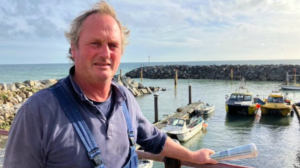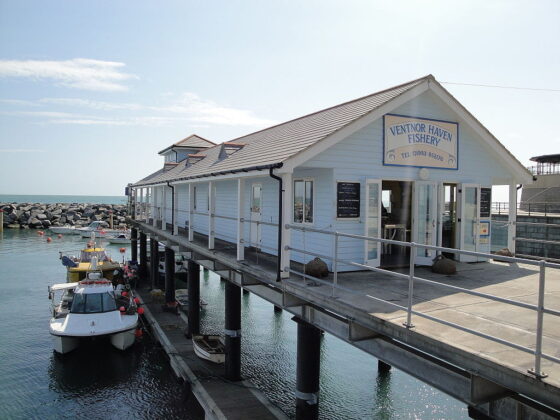
MCA a averti que ses règles détruiraient l'industrie de la pêche de l'IoW

Le pêcheur frustré de l'île de Wight, Geoff Blake, de Ventnor Haven Fishery, a appelé les médias à aider à faire pression sur la Maritime and Coastguard Agency pour qu'elle modifie son approche globale des règles de construction de bateaux.
Blake, s'adressant à BBC Radio Solent, a déclaré que les règles conçues pour rendre les bateaux de pêche plus sûrs pourraient mettre des vies en danger, et à cause de cela, il déteste commander de nouvelles embarcations.
"Nous sommes réduits à deux bateaux ici à Ventnor, qui sont à plein temps", dit-il. « Avant, nous pouvions nous approvisionner [en poisson] auprès de quinze autres bateaux autour de l'île ici, mais ils ont tous disparu. L'industrie de la pêche est une industrie en voie de disparition. Nous avons besoin d'au moins trois ou quatre bateaux ici pour avoir suffisamment de masse collatérale pour pouvoir faire fonctionner la chose, et si nous ne construisons pas ces bateaux, dans quelques années, cela [la pêche commerciale] n'existera pas, et je pense que l'industrie de la pêche sur l'île de Wight est très, très proche de l'effondrement total.
Actuellement, l'équipe de Blake utilise des catamarans fabriqués par Cheetah Marine . Il dit que c'est parce que les chats de Cheetah sont incroyablement stables et que les réservoirs de carburant sous le pont aident à maintenir le poids vers la ligne de flottaison, ce qui donne un centre de gravité bas.
Mais maintenant, si Blake veut un nouveau bateau construit selon le même design, il devra avoir le réservoir de carburant sur le pont. Il dit que cela rendra le bateau plus lourd et beaucoup plus susceptible de chavirer dans les eaux agitées au sud de l'île.

Pêcherie de Ventnor Haven
"La condition peut changer radicalement et très rapidement", a déclaré Blake à l'émission Alun Newman. "Ces bateaux sont rapides - nous pouvons rentrer rapidement à la maison, mais si vous frappez mal une vague scélérate, si votre centre de gravité est plus haut, alors le bateau est moins stable.
"Tout ce que vous pouvez faire, c'est faire tout ce que vous pouvez pour que le poids soit le plus bas possible, et vous vous retrouvez avec un bateau sûr, mais dès que quelque chose d'aussi lourd que le carburant est au-dessus du pont, c'est une chose de plus à aller mal, pour le faire tourner.
"Je compare ces bateaux à la voiture de rallye des bateaux de pêche, et je pense que si Mika Häkkinen devait mettre son carburant sur son toit, je ne pense pas qu'il tenterait même de faire un rallye car il sait faire le tour du premier coin vous vous retourneriez et c'est la situation que nous avons.
« Nous avons besoin de nouveaux bateaux – j'ai des jeunes gens qui veulent aller en mer – et nous avons besoin de ces bateaux sûrs pour eux. En ce moment, avec le règlement tel qu'il est, l'autorité censée veiller à notre sécurité fabrique un bateau moins sécuritaire que celui que nous avons construit il y a cinq ans.
«Nous avons besoin que les personnes qui établissent les règles comprennent réellement ce qu'elles disent, ce qu'elles font et les implications de cela. Il semble que personne ne réponde à une question, et nous n'avons aucun moyen d'aller nous plaindre quelque part que les règlements n'ont pas de sens. Tout ce que nous avons vraiment, c'est espérer que la presse pourra les réveiller à la situation. Nous ne devrions pas avoir à attendre que quelqu'un se noie avant que quelque chose n'arrive.
Sean Strevens, MD Cheetah Marine, déclare : « Les MCA sont de bonnes personnes, mais le système ne fonctionne pas. Je travaille dessus depuis plus de 10 ans.
«Ils étaient censés harmoniser les codes il y a des années, mais cela ne s'est pas produit. Il devrait y avoir une équivalence entre CE ISO, le code des bateaux de travail et le code de la pêche commerciale. Mais la bureaucratie empêche que cela se produise.
"Quand j'ai commencé à construire des bateaux fin des années 80 début des années 90, il n'y avait pas de code de bateau de travail. Les premières exigences de Seafish en 2000 étaient basées sur le code de bateau de travail MGN 280, qui fonctionnait bien pour nos conceptions.
"Le véritable problème de la sécurité des bateaux de pêche à l'époque concernait les conceptions traditionnelles avec des moteurs diesel intérieurs qui chaviraient ou coulaient en raison d'entrées d'eau, de joints d'arbre ou de problèmes d'écoutille, entraînant tous des inondations.
«Nous avons des compartiments de coque scellés et des moteurs hors-bord, ce qui est beaucoup plus sûr. Les règles devraient en tenir compte. Un centre de gravité vertical bas est important pour nous, mais le MCA pousse à augmenter les hauteurs de pont, à mettre des réservoirs à longue portée sur le pont et à augmenter le centre de gravité vertical (quih réduit la stabilité).
«Nous avons prouvé que les réservoirs de carburant sous le pont sont plus sûrs, plus résistants au feu, isolés (empêchant l'humidité), restent plus frais en été, ne gênent pas les opérations de pêche et sont donc beaucoup plus protégés. L'arpentage peut être effectué par l'inspection de l'écoutille du pont et des tests de pression si nécessaire.
«Le débat sur les chars dure depuis des années et la MCA les a eu dans et hors des normes au cours des 10 dernières années, mais toujours dans les normes pour les bateaux de travail et les bateaux CE.
"C'est très frustrant lorsque nous essayons de construire les bateaux les plus sûrs possibles."
La perplexité de Strevens est palpable.
« Nous pouvons construire trois bateaux pour pêcher en milieu de Manche, tous pour la pêche à la canne et à la ligne : loisir CE ISO cat B, code workboat charter, et pêche professionnelle. Tout devrait être différent – le bateau de pêche commerciale étant moins stable. En fait, il doit être plus stable car les opérateurs de pêche commerciale, naturellement, travaillent dans des conditions de mer plus agitées.
Cheetah construit des bateaux pour Blake depuis plus de 25 ans. Strevens a connu Blake toute sa vie – ils sont allés à l'école ensemble. "Toute sa famille est pêcheuse depuis de nombreuses années, et nous voulons lui construire le bateau le plus sûr possible, mais nous ne pouvons pas."
Selon la BBC, Blake essaie également de faire en sorte que le MCA examine la question depuis plusieurs années.
Dans une déclaration du MCA à la station de radio, l'organisation a souligné que la sécurité est toujours sa priorité absolue et que ses règles concernant les réservoirs de carburant au-dessus du bureau visent à minimiser les risques d'incendie, essentiellement parce qu'elles facilitent leur inspection et leur entretien. Cependant, la MCA a déclaré que si une proposition de réservoirs d'essence sous le pont était présentée, elle pourrait envisager de faire une exemption au cas par cas. De plus, s'il y avait plusieurs applications qui pourraient fournir suffisamment de preuves pour un changement général des normes.
Déclaration de l'Agence maritime et des garde-côtes
« Nous soutenons l'industrie de la pêche et reconnaissons les dangers encourus, c'est pourquoi la sécurité est toujours notre priorité absolue.
« Les modifications recommandées concernant l'emplacement des réservoirs de carburant ont été apportées pour minimiser les risques d'incendie et améliorer la sécurité de diverses manières, grâce à une surveillance appropriée à long terme par des tiers des systèmes connexes. Les derniers codes des navires de pêche prévoient des contrôles de sécurité améliorés par la MCA, grâce à des exigences d'entretien et d'inspection continus.
"Si une proposition d'installation d'un réservoir d'essence sous le pont était présentée au siège de MCA, via le processus normal de demande d'exemption, elle serait examinée sur ses mérites."
Les propositions de réservoirs d'essence sous le pont peuvent être soumises au MCA pour examen au cas par cas, ce qui peut aider à fournir des preuves pour la révision de la norme globale. Il est reconnu qu'il existe d'autres normes qui autorisent les réservoirs de carburant sous le pont. Cependant, il est important de noter que d'autres codes de pratique des navires commerciaux n'encouragent pas l'utilisation de l'essence mais offrent des moyens de le faire si les risques - en particulier ceux de l'arrimage sous le pont - peuvent être atténués de manière appropriée. Cela devrait inclure des vérifications et des inspections pour assurer une conformité continue, en vertu des codes des petits navires commerciaux et des bateaux de travail. Dans le cas de la pêche, l'impact physique de certaines méthodes et les préoccupations concernant l'entretien signifient que la MCA n'a pas les preuves requises pour un changement général en toute sécurité des règles pour le moment.
Image principale avec l'aimable autorisation du journaliste de BBC Radio Solent, Dominic Blake, via Twitter.
